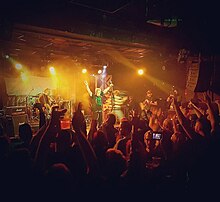Hungary has made many contributions to the fields of folk, popular and classical music. Hungarian folk music is a prominent part of the national identity and continues to play a major part in Hungarian music. It is also strong in the Szabolcs-Szatmár area and in the southwest part of Transdanubia. The Busójárás carnival in Mohács is a major Hungarian folk music event, formerly featuring the long-established and well-regarded Bogyiszló orchestra.

Tihany /ˈtihɒɲ/ is a village on the northern shore of Lake Balaton on the Tihany Peninsula. The whole peninsula is a historical district.

Omega is a Hungarian band formed in 1962, which has been described as the most successful Hungarian rock band in history. They have released more than 20 albums both in Hungarian and English. After several early personnel changes, their classic lineup came together in 1971 and was intact for more than forty years. Singer János Kóbor has been with the band continuously since 1962; keyboardist/singer László Benkő was present from 1962 until his death in 2020; while guitarist György Molnár and drummer Ferenc Debreczeni joined in 1967 and 1971 respectively. Bassist Tamás Mihály was a member of the band from 1967 to 2017. They have won several prestigious awards for their contributions to Hungarian culture.

Tibor Szemző is a Hungarian composer, performer, media artist. His pieces often include spoken texts, film and other media. He creates installations and composes music for his own and others’ films. Ever since the beginning of his career, he has been performing actively and widely in Hungary and abroad as well.

Beatrice is a Hungarian rock band. It was founded in 1969 as a women's band, and played mostly cover songs. In 1971, Nagy Feró joined the band as a frontman. In the following years, the members were gradually replaced, and from 1974 they began to write their own songs in the then popular glam rock style. In order to get a record deal the band became oriented towards disco music from 1976.

FreshFabrik is a Hungarian two times award-winning industrial nu metal band, consisting of Szabolcs Oláh aka (kju:), András Szabó (drums) and Levente Kovács and László Szvoboda. FreshFabrik is the first Hungarian English-singing rock/metal band using DJ and rap performances, and the first Hungarian rock/metal band contracted to a major record label. FreshFabrik is one of the best-selling English-singing Hungarian rock bands of all time. After a three-year break, in 2011 they released a brand new album MORA. In 2013, after a successful 20 years anniversary tour, FreshFabrik released a new single, and video Higher & Higher with reunited members: Istvan Horvath and Matyas Koncz.
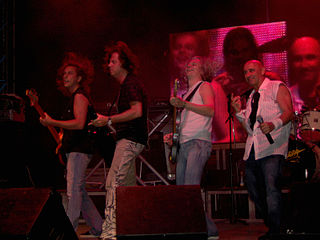
Hungarian rock has been a part of the popular music of Hungary since the early 1960s. The first major bands were Illés, Metró and Omega. At the time, rock was not approved of by the Hungarian Communist authorities. In the 1970s, the Communists cracked down on rock, and Illés was banned from recording. Some members of the other bands formed a supergroup called Locomotiv GT, while the band Omega became very popular in Germany.

The Ferenc Puskás Stadium, or formerly People's Stadium (Népstadion) was a multi-purpose stadium in the 14th district (Zugló) of Budapest, Hungary. It was situated between the Puskás Ferenc Stadion and the Keleti pályaudvar metro stations. It was used mainly for football matches. The stadium, which was an all-seater, had a capacity of 38,652, though its original capacity exceeded 100,000. The stadium was closed in 2016 and demolished in 2017 to give place to the Puskás Aréna.

Sledgeback is a Seattle, Washington-based punk rock band, formed in early 2004, with Hungarian born American guitarist Gábor Szakácsi as the front man. Former member of the long-standing influential Hungarian punk rock outfit C.A.F.B., "Gabi Hun" moved to Seattle not knowing a word of English, and soon after formed Sledgeback.
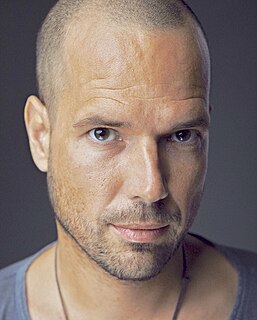
Benedek "Bence" Fliegauf is a Hungarian film director and screenwriter.
Tankcsapda is a Hungarian heavy metal and hard rock band.
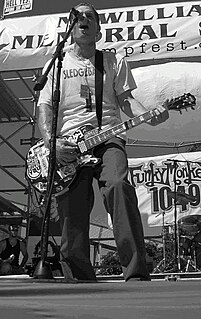
Gábor Szakácsi is a Hungarian-born American rock guitarist and music producer, best known as the frontman of Seattle punk group Sledgeback. He fronted C.A.F.B., one of the most influential Hungarian punk bands of the 1990s, with whom he released six full-length albums between 1993 and 2017. After leaving Hungary Hun started Sledgeback in 2004 and released several albums with the group. His distinct voice became the trademark of Sledgeback.

Irén Lovász is a Hungarian folk singer and ethnographer. She has a total of 12 albums to her credit, including on the Erdenklang Music, CC'nC Records, Fono, and Hungaroton Classics labels as well as recent CDs on her own SIRENVOICES label. She is featured on several compilations, including on the HEARTS OF SPACE label, WARNER MUSIC France, Minos-EMI, and other world music compilations.
Psalmus Hungaricus, Op. 13, is a choral work for tenor, chorus and orchestra by Zoltán Kodály, composed in 1923. The Psalmus was commissioned to celebrate the fiftieth anniversary of the unification of Buda, Pest and Óbuda for a gala performance on 19 November 1923 along with the Dance Suite by Béla Bartók, and the Festival Overture by Ernő Dohnányi, who conducted the concert. The work's first performance outside Hungary took place under Volkmar Andreae in Zürich on 18 June 1926. This marked a turning point in the international recognition of Kodály as a composer, beyond his renown as an ethnomusicologist and music educator.

Wisdom was a Hungarian power metal band from Budapest. Formed in autumn 2001, the group is known for its practice of basing each song on a well-known quotation. Many of the band's lyrics and all of the album covers center on the story of an old man, a cult figure called Wiseman.
Hungarian pop is the pop music scene of Hungary. It is often associated with Rezső Seress's song "Gloomy Sunday" which was covered by numerous artists. The most notable artists include Kati Kovács, Zsuzsa Koncz, Judith Szűcs, Péter Máté, Locomotiv GT, Omega, Neoton Família, Karthago, Jimmy Zámbó. Among the new talents are Kállay Saunders and Linda Király.

Attila László is a Hungarian jazz guitarist and composer. László is one of the leaders of Hungary's second generation of jazz musicians, which includes Lakatos, Dés, Kőszegi, and Pege. He was president of the Hungarian Jazz Federation (1999–2005) and performed with Anthony Jackson, Randy Brecker, James Moody, David Friedman, Gary Willis, Bob Mintzer, Peter Erskine, Hiram Bullock, Miroslav Vitous, Ilaiyaraaja, Russell Ferrante, and Jimmy Haslip. Laszlo won the Golden Cross of Merit prize.
Ármin Jamak is a Hungarian indie musician, best known as the lead singer of the Hungarian indie band Carbovaris.
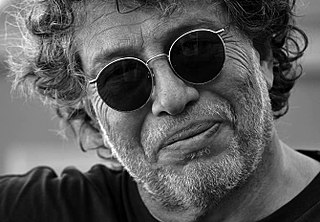
Gábor Presser is a Kossuth Prize winner and a Hungarian musician, composer, singer. He is member in Locomotiv GT and was member in Omega, a prominent personality of the Hungarian pop music.
